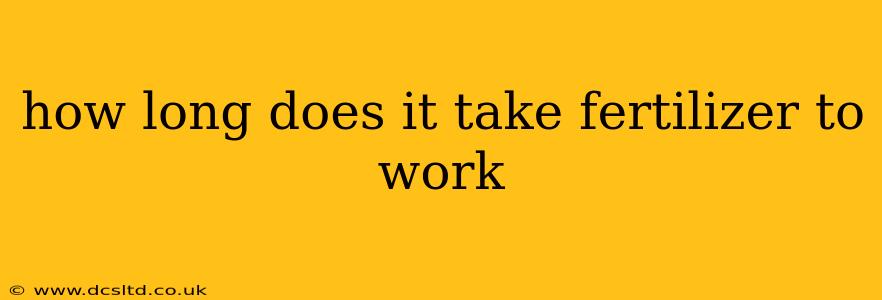How Long Does It Take Fertilizer to Work? A Comprehensive Guide
The question, "How long does it take fertilizer to work?" doesn't have a single, simple answer. The timeframe depends on several crucial factors, including the type of fertilizer, the plant's needs, soil conditions, and environmental factors like temperature and moisture. Let's delve into the specifics.
What Kind of Fertilizer Are You Using?
Different fertilizers release nutrients at different rates. This is often categorized as:
-
Fast-Release Fertilizers: These are often inorganic fertilizers that dissolve quickly, providing a rapid boost of nutrients. You'll see visible results within days to a couple of weeks, but the effects are shorter-lived. Think of a quick energy drink for your plants. Examples include soluble salts like ammonium nitrate.
-
Slow-Release Fertilizers: These release nutrients gradually over weeks or even months. This consistent feeding prevents nutrient burn and provides a more sustained period of growth. Organic fertilizers, like composted manure or bone meal, generally fall into this category. Think of a sustained-release vitamin for your plants.
-
Controlled-Release Fertilizers: These are engineered to release nutrients at a predetermined rate, often utilizing a coating or special formulation. This offers precise nutrient delivery over a specific period.
What Are the Specific Needs of Your Plants?
Different plants have different nutrient requirements and growth rates. Fast-growing vegetables might show visible responses to fertilizer sooner than slower-growing perennials. Consider the plant's life cycle and its nutritional demands. A young seedling will require different nutrients and respond differently to fertilization compared to a mature plant.
What's the Condition of Your Soil?
Soil type and health significantly impact fertilizer effectiveness. Poor soil drainage can prevent nutrient uptake, delaying visible results. Soil testing is highly recommended to understand your soil's composition and identify any deficiencies that might need addressing before applying fertilizer. Healthy soil already teeming with beneficial microbes can accelerate the process.
What Are the Environmental Conditions?
Temperature and moisture play crucial roles. Warm temperatures and adequate moisture facilitate nutrient absorption. Cold temperatures or drought conditions can significantly slow down the process. Consider the time of year and local climate when applying fertilizer.
How Can You Tell If the Fertilizer is Working?
Look for these indicators:
- Improved growth: Noticeably greener leaves, more vigorous growth, and increased flowering or fruiting are excellent signs.
- Healthier plants: Look for improved leaf color, fewer signs of disease or pest infestation, and overall plant vigor.
- Increased yield: For fruiting plants, an increase in the size or quantity of fruits or vegetables is a direct result of proper fertilization.
How Long Does It Take For Different Types of Plants To Respond?
The timeframe varies widely depending on the plant type. Fast-growing annuals like lettuce may show improvements within a week or two, while slower-growing trees or shrubs may take several months to show noticeable results.
What if I Don't See Results After a Reasonable Time?
If you've applied the fertilizer correctly and haven't seen any results after a reasonable amount of time (considering the type of fertilizer and plant), consider these factors:
- Incorrect application: Did you apply the correct amount? Was the fertilizer evenly distributed?
- Soil pH issues: Improper soil pH can lock out nutrients, hindering their absorption. A soil test can help identify this problem.
- Other limiting factors: Are there other limiting factors such as insufficient sunlight, water, or pests affecting the plant's growth?
By understanding these factors, you'll be better equipped to determine how long it will take for your fertilizer to work and troubleshoot any issues that may arise. Remember, patience and observation are key to successful fertilization!
